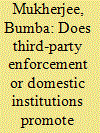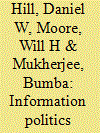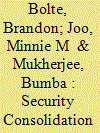|
|
|
Sort Order |
|
|
|
Items / Page
|
|
|
|
|
|
|
| Srl | Item |
| 1 |
ID:
074658


|
|
|
|
|
| Publication |
2006.
|
| Summary/Abstract |
What causes peaceful resolution of civil wars to endure rather than to collapse into renewed fighting? Existing studies predict that third-party peace enforcement by the United Nations (UN) or domestic institutions such as democracy, parliamentary, and presidential institutions and the proportional representation (PR) electoral system promotes enduring peace in societies that have emerged from a civil war. However, extant empirical works test the effect of third-party enforcement but not the impact of domestic institutions on peace after civil wars. Hence, I test the impact of democracy, presidential, and parliamentary institutions, electoral systems-PR and majoritarian-and third-party enforcement by the UN on the durability of peace after termination of civil wars. Results from a bootstrapped Weibull duration model show that democracy and the PR electoral system significantly reduces the likelihood that civil war may recur, but that third-party enforcement by the UN does not have a significant effect on the hazard rate of peace spells. A brief case study analysis of recent attempts to build democratic institutions in Cambodia and Kosovo by the international community also supports the claims posited in this article.
|
|
|
|
|
|
|
|
|
|
|
|
|
|
|
|
| 2 |
ID:
120867


|
|
|
|
|
| Publication |
2013.
|
| Summary/Abstract |
''Information politics'' INGOs such as Amnesty International have incentives to maintain their credibility by carefully vetting information about rights abuses committed by governments. But they are also strategic actors that may inflate allegations of abuse to fulfill organizational imperatives. This raises an intriguing question: When are INGOs more likely to exaggerate their allegations? In answer to this question, we argue that news media reporting pressures INGOs to comment for organizational reasons, even if the information available to them is poor. On the other hand, higher numbers of domestic human rights NGOs increase the quality of available information, and INGOs will find more credible information provided about states as the winning coalition to the selectorate rises. Yet, an incentive to exaggerate allegations under certain conditions does not imply that INGOs will always do so. Indeed, there exists significant observed variation in INGO reports about government abuse. To test our hypotheses, we employ a zero-inflated ordered probit model with correlated errors that permits us to model an unobservable probability (the probability that the INGO exaggerates its allegations) and correct for potential bias. Results provide support for our hypotheses, and suggest that Amnesty International adheres to its credibility criterion, rarely succumbing to incentives to exaggerate abuse.
|
|
|
|
|
|
|
|
|
|
|
|
|
|
|
|
| 3 |
ID:
181161


|
|
|
|
|
| Summary/Abstract |
Policymakers and peacebuilding research often focus on rebel groups when studying demobilization and integration processes, but post-war governments must also manage the non-state militias that helped them gain or maintain power. Why do some post-war governments disintegrate their militia allies, while others integrate them into the military? We argue that when a salient ethnic difference exists between the (new) ruling elite and an allied militia, a process of mutual uncertainty in the post-war period will incentivize governments to disintegrate the group. However, governments will be most likely to integrate their militias when the military has sufficient coercive capabilities but few organizational hindrances to re-organizing. Using new data on the post-war fates of victorious militias across all civil conflicts from 1989 to 2014, we find robust support for these claims. The results suggest that a government’s optimal militia management strategy is shaped by both social and organizational constraints during the post-war period.
|
|
|
|
|
|
|
|
|
|
|
|
|
|
|
|
| 4 |
ID:
074831


|
|
|
|
|
| Publication |
2006.
|
| Summary/Abstract |
This paper develops a bargaining model that explains why political power-sharing agreements lead to peaceful resolution of civil wars between governments and insurgents in some cases, but not others. The model predicts that if the civil war ends in a military stalemate, the government uses its offer of a political power-sharing agreement to the insurgents as a tool to misrepresent private information about its military capacity and defeat the insurgency. This exacerbates commitment problems, increases the degree of support that insurgent leaders receive from their civilian supporters and consequently increases the likelihood of recurrence of civil war. Conversely, the model shows that when the war ends in a decisive military victory for the government or the insurgents, the offer of a political power-sharing agreement reduces the degree of support that insurgent leaders get from their civilian supporters and increases the costs of fighting for the insurgents. Hence, after a decisive military victory insurgents have incentives to accept the political power-sharing agreement and not revert to fighting. Results from Cox Proportional Hazard models estimated on a data set of 111 civil wars (1944-1999) provide robust statistical support for the model's predictions.
|
|
|
|
|
|
|
|
|
|
|
|
|
|
|
|
|
|
|
|
|